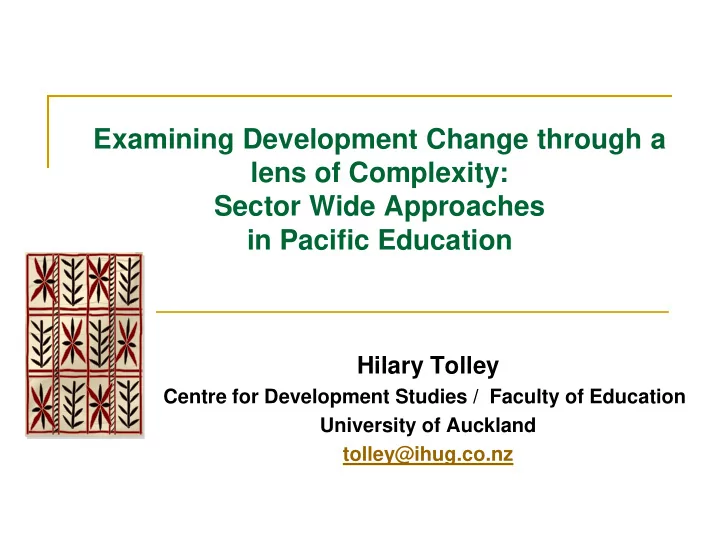

Examining Development Change through a lens of Complexity: Sector Wide Approaches in Pacific Education Hilary Tolley Centre for Development Studies / Faculty of Education University of Auckland tolley@ihug.co.nz
Outline & Introduction Orthodox approach to development – better aid agenda & results based management frameworks Complexity perspectives Education SWAPs in Solomon Islands and Tonga Re-visioning aid effectiveness & development
Better aid agenda & results based management (RBM) frameworks Harmonisation Partnership & mutual accountability Ownership Alignment with local processes Managing for results = Sector wide approaches + RBM frameworks
Complexity Perspectives View development as a COMPLEX ADAPTIVE SYSTEM – a “messy reality” - agents react , adapt and co-evolve and unpredictable non-linear change emerges – sensitive to initial conditions and responsive to inherent energy
How is a Complexity Perspective useful in Development ? Seeks to understand the dynamics of change and develop capability to know how and where to influence the direction of change
Case Studies Tonga Solomon Islands Pop: 100,000; Polynesian, Pop: 550,000; Melanesian 98%Tongan Geographically, culturally 70% live on Tongatapu. 4 & linguistically diverse >80 main island gps. 36/150 languages. 342/992 islands inhabited islands inhabited monarchy for over 1000yrs; 80% rural subsistence; strong hierarchical social 60% communities >200 structure “Post-conflict state” - Civil unrest 2005-6 – “fragile Tensions 1998-03 state” 1 st SWAp in Pacific – 2 nd Pacific SWAP SIG/NZAID/EU, 2003-4 GOT/NZAID/WB, 2004-5 High education indicators Low education indicators Mature education ministry
Applying notions of Complexity to Case Study SWAp experiences The degree of connectivity identified in each system Importance of influence of the ‘whole’ context - sensitivity to initial conditions The extent to which ‘space of the possible’ was acknowledged – provision of a ‘safe’ place for innovation and exploration; whether experimentation is resisted, tolerated or encouraged
Re-visioning aid effectiveness & development Development = Complex Adaptive System: change evolves from behaviour of whole system ’ Aspirations should not be confused with what is achievable: pay attention to what actually happens than what should have happened Real time learning: pay attention to feedback loops to enhance/dampen certain effects Learn how to nudge change in desired direction
Thank You
Recommend
More recommend